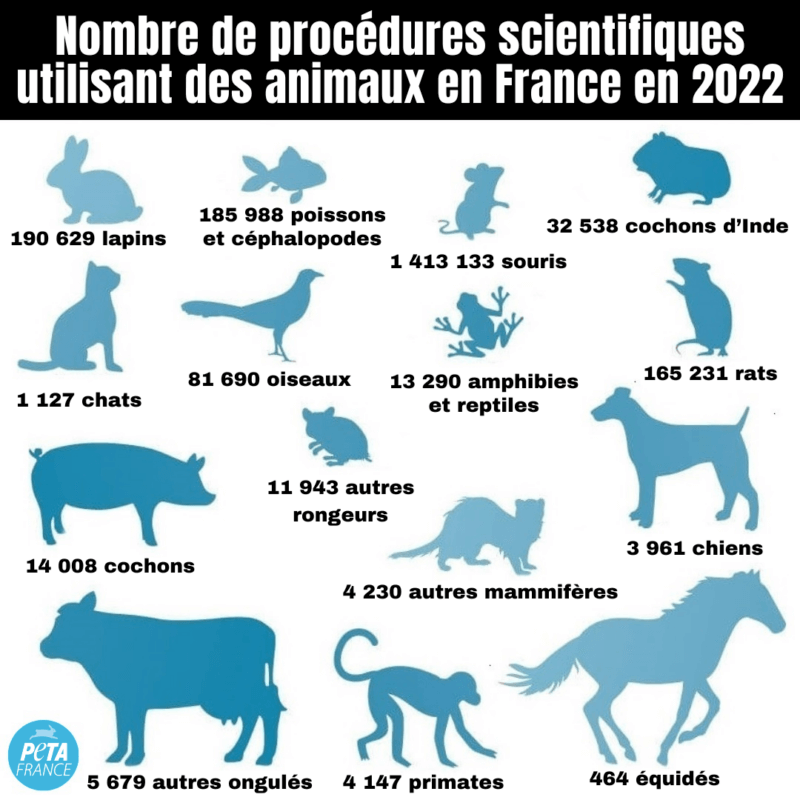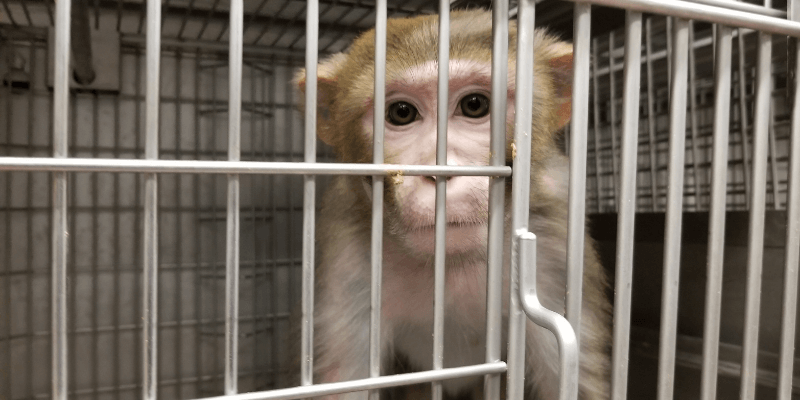
Recently published statistics show that in 2022, 2,128,058 scientific procedures were carried out on animals in France – an increase of 12% compared to 2021. This increase is linked to a change in statistical reporting imposed by the European Commission: animals subjected to invasive genotyping procedures were included in the report for the first time.
In France, 326,033 animals such as pigs, sheep and cows have undergone genotyping procedures during which their ears are sometimes notched (pieces of them are cut out) and their blood is sometimes taken from the jugular vein. If the same methodology used in 2021 had been applied for data reporting, the total number of scientific procedures conducted on animals would have been 1,802,025, a decrease of 4.9% from last year .
The annual report highlights the suffering endured by mice, rabbits, fish, monkeys, dogs and other animals who have been poisoned, subjected to psychological distress and brain damage, infected with diseases, forced to ingest toxic substances, deprived of food, water or sleep, and killed. Instead of a significant, ethically necessary reduction promised by the government, the use of animals in experiments remains decidedly high.

In a concerning trend, the use of primates increased by 15%, from 3,593 procedures in 2021 to 4,147 in 2022. The use of genetically modified animals also increased significantly. In 2021, they represented 25.8% of animals used, but in 2022 this figure increased to 38.5%, with 710,934 uses of genetically modified animals.
Experiments on animal genetic material have long-lasting and often painful effects. Genetically modified animals are often forced to live with debilitating conditions such as missing eyes or ears, skin ulcers, deformed body parts, deafness, seizures and heart failure. In 2022, there were 108,793 uses of animals with a harmful phenotype. But this is only one aspect of the suffering caused.
These nightmarish practices begin with females being injected with hormones before they undergo abdominal surgery or are brutally killed so their eggs can be harvested. Others are forced to undergo surrogacy and modified embryos are surgically implanted into their uteruses.
However, these genetic modification procedures are rarely successful. Many pregnancies fail and, among the animals that are born, only 1 to 30% carry the genes that interest experimenters. The others are killed shortly after birth and thrown away as simple laboratory waste.
The flaws in animal experimentation and the consequences on animal life
The use of animals for scientific experimentation not only results in intense suffering and cruelty, it is also fundamentally inappropriate. Studies have repeatedly shown that animal testing does not benefit human beings and wastes valuable resources and the lives of sentient beings. These misleading tests waste an enormous amount of time and money, with a large percentage of preclinical research not being reproducible.
Animal models are often criticized for their limitations, as differences between species prevent them from serving as accurate analogues for understanding the biological idiosyncrasies needed to develop safe and effective treatments for humans. A paradigm shift toward human-relevant research methods, such as organoids and computational models, is crucial to providing effective, patient-friendly treatments.

French citizens demand an exit strategy!
In 2023, a survey found that 75% of French people surveyed said they were very concerned about the use of animals in scientific research, testing and education. They stressed the need to redouble efforts to rapidly replace animal experiments and called on the government to establish a coordinated strategy for a transition to animal-free methods. This initiative is also supported by more than 248,000 French citizens who have signed the European Citizens' Initiative in favor of a roadmap for the gradual elimination of all animal testing.
PETA's Research Modernization Deal sets out a strategy for transitioning to animal-free research. The government must move with the times and put an end to archaic animal experiments. Equipping future scientists with sophisticated, humane research tools is the best way to preserve the lives of humans and other animals.
Call on the government to act and save lives
Join thousands of PETA supporters to demand the French government to end all animal experiments and finally develop an exit strategy!
Sources : PETA France - article written by Marie J.
Posted on 2024-01-23 12:54








Comments